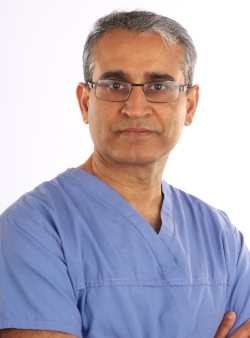The six most common questions asked in a knee clinic
Consultant Knee Surgeon Mr Sanjeev Anand, answers some of the common questions asked in his knee clinic.
"My knee hurts- should I worry?"

Knee can be painful after an injury or sometimes without any previous injury. After an injury, if you are unable to put weight on the injured leg or the knee is swollen, you should seek advice. Swelling in the knee after injury usually suggests bleeding in the joint from a damaged structure and should be assessed by an expert dealing with knee injuries.
Knee can also be painful without a definite injury due to repetitive stress from activities like running, jumping or other loading activities. This is usually due to strains or sprains of ligaments or tendons. If pain does not improve after a few days of rest, consider seeing a physiotherapist. If symptoms persist, seek advice from a surgeon as some interventions can help recover function.
Sometimes joints hurt because of progressing arthritis in the joints. This is usually associated with stiffness. You may struggle to walk up and down hills or manage stairs. In such situations, if your pain is disabling consider seeking medical advice. A X-ray can confirm severity of arthritis. If arthritis is not severe, often losing weight and strengthening muscles helps. Around 3-4 times of your body weight goes through your knee joint in activities like going up and down stairs, so losing even a few kilos helps.
"What is the clicking in my knee joint?"
Arthritis itself can cause clicking which can be painful. Arthritis usually causes a grating sensation due to rough joint surfaces moving against each other.
A painful click or a ‘clunk’ from abnormal movement in a joint should always be checked over by an expert.
"Does exercise damage my knee joint?"

Joints get their nutrition from movement and generally, movement is good for joints. Unless you have an injury, the benefits of exercise in improving your general health and mental wellbeing far outweigh any risks from exercises.
This advice, however, may change if you have had an injury. An injured joint moves in different manner compared to a normal joint and you may be better off returning back to exercises after treatment of your injury and under supervision of a specialist. Similarly, if you have an overuse injury, a period of rest followed by gradual introduction of activities can help prevent your injury to become a long-term problem.
"Would food supplements help my knee pain?"
If you eat a balanced and varied diet, addition of further dietary supplements does not give any extra benefit for your joint health. Paradoxically people with healthier diets and lifestyles are more likely to take dietary supplements because they are more health conscious. There are various supplements available in market:
Chondroitin and Glucosamine - Usually available as combination capsules, Chondroitin and Glucosamine are part of normal joint cartilage, the tissue that cushions the joints. They are produced naturally in the body. There is conflicting weak evidence from research studies suggesting that supplement of Glucosamine and Chondroitin can give mild relief for knee osteoarthritis over a short term period. Though there are no serious side effects with the use of these supplements, they may interact with blood thinning medicine warfarin. They may also influence how your body handles sugar. If you are on warfarin or are diabetic, please consult your doctor before starting these supplements.
Omega-3 (Fish oil/Fish liver oil) supplements- Omega-3 fatty acids are a kind of fat found in foods and in the human body. They are available on their own; as part of multivitamin tablets or in Fish oil or Fish liver oil supplements such as cod liver oil. There is more evidence of benefit from eating a seafood diet than taking omega-3 supplements.
Type of omega-3 found in seafood and fish oil has been shown to have some benefit in relieving symptoms of rheumatoid arthritis and reducing the need for anti-inflammatory tablets. Still, conventional medical therapies for rheumatoid arthritis can slow joint damage. If you have rheumatoid arthritis, please don’t change your prescribed medicines without consulting your doctor. If you are allergic to fish or shellfish or are taking medicine that affects blood clotting, consult your doctor before taking omega-3 supplements.
Turmeric- This one is showing promising results. Turmeric is a spice often used in Indian cooking. It has an active ingredient called curcumin, which has anti-inflammatory properties and has been shown to have pain-relieving effects. In various trials it has shown to improve pain and function in knee osteoarthritis as compared to placebo treatment.
"I have a damaged knee joint, would wearing a brace help?"
Braces can be useful under certain circumstances and your specialist may be able to prescribe the right one for you.
Soft braces by putting pressure around a joint can give a sense of wellbeing and patients often find them helpful but they don’t protect joint from abnormal movements.
Rigid braces often come with hinges which allow knee to bend. They can help in arthritis by moving load from a diseased part of the joint to a relatively normal part of the knee joint. By using them, you may be able to delay or avoid a surgery. Some people find a rigid brace useful to support their joint after a ligament injury. There are specific braces designed to support different ligaments which can help you lead a more active lifestyle.
"My child’s knee hurts. Is it growing pain?"
While growing pains are very common in children between the ages of three to twelve, not all pain in legs is due to growing pain. Growing pain is usually felt in both legs, often in muscles on front of the thigh or in calves behind legs. They don’t cause any pain in the joints or swelling or redness. If there is anything different to see at the site of pain, it is unlikely to be growing pain.

There is no test to confirm growing pain, but an expert can rule out other common causes of pain by assessment or scans. It may be useful to get a medical opinion, if your child has pain in one leg only; is limping; is unwell; has pain in one or many joints; pain which is very severe; or has swelling, redness or rash.
A child’s bones and muscles are still developing, and we are increasingly seeing more overuse injuries in very active kids. Any treatment for injuries in children has to respect the developing skeleton to minimise any risk of affecting growth of bones."
Note- The Author is a specialist knee surgeon, and the above reflects his opinion on common questions asked by his patients in knee clinics. It is a general advice and may not be applicable to every individual or their knee condition. If you have any concerns about your knee joint, please seek specialist advice.
About Mr Sanjeev Anand
Mr. Anand has special interest in treating all aspects of knee problems from sporting injuries to the arthritic knees. As a surgeon practicing at a tertiary referral centre, a major part of his practice involves managing complex problems referred from colleagues and neighbouring hospitals. He also regularly treats paediatric knee problems both in the NHS and in private sector. Read more about Mr Sanjeev Anand.
Read more about Orthopaedics at Nuffield Health Leeds Hospital

